Adrian Collins's Blog, page 18
June 2, 2025
REVIEW: The River Has Roots by Amal El-Mohtar
Amal El-Mohtar took the Internet by storm with her novella This is How You Lose the Time War, co-written with Max Gladstone. She now returns with her solo debut novella The River Has Roots, stretching the legs of her whimsical and lyrical prose. The River Has Roots follows two dutiful sisters, Esther and Ysabel Hawthorn, devoted to tending and harvesting the enchanted willows by the River Liss, on the edge of Faerie, by singing their joint tunes to honour the magical trees. This devotion takes root, first and foremost, in the sisters’ love for one another, who cherish each other more than anything. When Esther rejects a forceful human suitor for her Fae lover, the dejected takes matters into his own hands, testing the strengths of sisterhood between Esther and Ysabel.
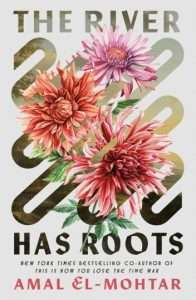 The writing is atmospheric and charming, flitting between verses of poetry and prose, supported by the illustrations throughout the story, giving readers breaks to supplement the whimsy of the tale. I loved the main characters; Esther and Ysabel were a delight, and so multifaceted. The realities of sisterhood felt encompassed within their relationship, which is no small feat at all. They captured the sweetness of having a constant companion in your sibling, as well as the acute heartbreak of losing them to the love of another. El-Mohtar writes emotion as if she is peaking into the window of a soul and transcribing what she sees; it is genuine artistry.
The writing is atmospheric and charming, flitting between verses of poetry and prose, supported by the illustrations throughout the story, giving readers breaks to supplement the whimsy of the tale. I loved the main characters; Esther and Ysabel were a delight, and so multifaceted. The realities of sisterhood felt encompassed within their relationship, which is no small feat at all. They captured the sweetness of having a constant companion in your sibling, as well as the acute heartbreak of losing them to the love of another. El-Mohtar writes emotion as if she is peaking into the window of a soul and transcribing what she sees; it is genuine artistry.
I found myself slightly confused and frustrated at the magic system, known as Grammar. It is essentially an elusive form of magic that changes and transforms. Had the story been slightly longer, perhaps it would have allowed the magical system to create a concrete foundation in the story, and thus flow easier. Nevertheless, the magic added to the overall charm of the novella, and also added to the grimdark aspect. The mystery behind Faerie, and what you do and do not see, lends a grimdark hand in the story as a whole; you could easily step forth into your demise, as much as into a dream.
At its heart, The River Has Roots is an ode to sisterhood, before it is an ode to love, poetry or revenge. For any readers who are looking for a swift and quick novella, one filled with heart and charm and the promise of an everlasting bond, I’d suggest picking up this gem. In the hands of Amal El-Mohtar, any fairytale can be transformed into an epic story.
Read The River Has Roots by Amal El-MohtarThe post REVIEW: The River Has Roots by Amal El-Mohtar appeared first on Grimdark Magazine.
June 1, 2025
REVIEW: The Whisper that Replaced God by Timothy Wolff
The Whisper that Replaced God novellas by Timothy Wolff are unerringly clever, poignant, dark, unhinged and all around lovable pieces. Narrated by our main character, Lord Mute, we’re introduced to a dark world but through the eyes of a “romantic” (read stalker), layered, certifiably insane, tragic, masochistic-and-sadistic psychopath.
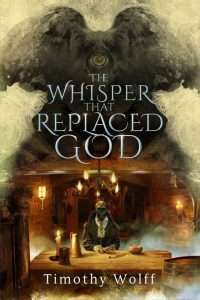 Oh, also, he’s a prince who wields a dagger and the power of the reviled god of silence to commit assassinations at the request of his brother, the king. Also, he’s in love with a prostitute who hates his very existence.
Oh, also, he’s a prince who wields a dagger and the power of the reviled god of silence to commit assassinations at the request of his brother, the king. Also, he’s in love with a prostitute who hates his very existence.
Like I said: layered and certifiably insane.
“Prisons contain one of the sadder of truths: the quickest way to make everyone equal is to make them worthless.”
Now, before we get too into this review, a quick disclaimer: these are two novellas that I’m reviewing at the same time. The official titles are The Whisper that Replaced God and The Whisper that Replaced God II: Silent Almighty. The reason I’m reviewing both at the same time is that, in my opinion, they should be read back-to-back and treated as a singular piece. While you could read book one The Whisper That Replaced God and be satisfied with it as a stand-alone piece, Lord Mute’s tale is clearly not done at the end of book one, and Silent Almighty provides a more concrete ending.
With that out of the way … these novellas are simply fantastic. Lord Mute’s narration is sardonic, witty, and unflinching. Except for when he flinches, which is a lot, because he’s deeply traumatized. Little things will phase him while big things will have absolutely no effect. It wraps you in and makes you feel like you understand how a stalker, a psychopath, and a hurt young boy feel.
Wolff’s prose in The Whisper that Replaced God borders on purple but never fully enters the realm of pretentiousness, except for a few tongue in cheek moments that are scattered throughout the novella—including a reference to things like “PleasantReads” and other winks.
The writing itself is sublime. You could pull up any random page and find some incredible writing. For example “We don’t choose what we favor. If we did, the world would be all the more simple, and all the less beautiful. It’s all some strange amalgamation of chaos and nature.” —That’s just a random page I turned to. On a pound-for-pound, page-for-page basis, The Whisper that Replaced God operates at an elite level.
There’s an undercurrent of political and religious machinations beneath the plot that Lord Mute is simply not intelligent enough to figure out. His brother and royal family are up to some things, and the god he worships who gives him the Gift of Silence is hated for seemingly just reasons. Mute doesn’t really know why or how though. We, the audience, know something is wrong, but Mute carries on unbothered. Until it all bites him in the ass. Then he’s bothered.
“I had dared to become God, then wept as heaven became a prison of my own construct.”
Keeping everything together in The Whisper that Replaced God is the humor throughout both novellas. Sometimes it’s biting sarcasm, sometimes it’s “unintentional” in the sense that Mute doesn’t understand why it’s funny, and sometimes it’s slapstick. It’s always there though, just like the silence and disdain Mute sees in every corner of the world.
My only problems with The Whisper that Replaced God is something that stems from the length. Once again, these are novellas, and even though these pieces are jam packed with content, there’s things that most novellas can’t pull off. The ending, while cryptic and foreboding and ambiguous, leaves you wanting more. It’s a perfect appetizer, but still, an appetizer it is.
The good news is these will be supporting Requiem of Dice, book one of the series. It’s not released yet, but it’s my most anticipated book. Until then, I’ll be waiting in an uneasy, unnatural silence.
Read The Whisper that Replaced God by Timothy WolffThe post REVIEW: The Whisper that Replaced God by Timothy Wolff appeared first on Grimdark Magazine.
May 31, 2025
REVIEW: Cold Eternity by S.A. Barnes
Cold Eternity is the third female-led, space horror from author S.A. Barnes (pen name for Stacey Kade) and this time we’re on a literal ship of the dead steeped in what is becoming Barnes’ signature level of creep-factor. We meet Halley, on the run and hiding from political forces that would rather she stay gone permanently following an election furor she knows a bit too much about. In desperation, she accepts a shady job on the Elysian Fields, an oversized cold-storage for the rich and powerful of the past, cryogenically frozen in the hopes medical science could one day extend their lives. She is recruited by caretaker Karl, who needs an extra hand monitoring things around the ship while he tries to keep it functioning and keep the corporate board off his back. Without better options, Halley agrees despite the low pay and the suspicious way Karl operates.
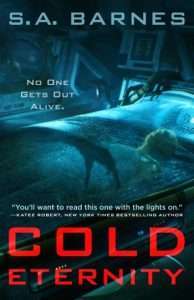 She is drawn, in part, to the job because of a traumatic experience she had years ago as a child, when the Elysian Fields functioned as a museum. After she arrives, Karl gives her a quick tour by hopping from one video screen to the next. Shows her to the Security Office where she needs to press a button once every 3 hours, to the dusty room she can bunk in, and explains which levels she needs to patrol. It sounds unrelenting and unfriendly, with Karl complaining her predecessor up and abandoning their duties without so much as a goodbye, and Halley’s need to stay hidden she starts the unforgiving routine, grabbing short snatches of sleep between patrols and button presses.
She is drawn, in part, to the job because of a traumatic experience she had years ago as a child, when the Elysian Fields functioned as a museum. After she arrives, Karl gives her a quick tour by hopping from one video screen to the next. Shows her to the Security Office where she needs to press a button once every 3 hours, to the dusty room she can bunk in, and explains which levels she needs to patrol. It sounds unrelenting and unfriendly, with Karl complaining her predecessor up and abandoning their duties without so much as a goodbye, and Halley’s need to stay hidden she starts the unforgiving routine, grabbing short snatches of sleep between patrols and button presses.
It doesn’t take long for things to begin unravelling, as a sleep-deprived and on-edge Halley starts to notice things that shouldn’t be possible. Starts to see things that are too bizarre and horrific to be real. It’s the lack of sleep, the stress, causing her imagination to overreact… right? Trying to keep herself sane with minimal sleep, long periods of isolation and no one to talk to besides a recalcitrant Karl who seems more than willing to manipulate her to get what he wants begins to prove difficult. Throw in a glitchy, all-too-aware, AI that traumatised Halley as a child and the foreshadowing tension in Cold Eternity is thick enough to slice.
As we tumble deeper down the spiral of this creeptastic plot, Cold Eternity turns the screw mercilessly on the already taut horror woven through it. What could possibly go wrong on a ship full of centuries-old rich people corpsicles? Yes, it may seem an obviously cursed scenario but Barnes has cleverly taken this in directions you may not expect. She hasn’t relied on body horror to carry Cold Eternity, which has a juicy level of tension throughout and some excellent moments to shock you. With short chapters and fast-paced prose, Cold Eternity pulls you deep into a tense and twisting space horror plot that will have you devouring it keenly.
Read Cold Eternity by S.A. BarnesThe post REVIEW: Cold Eternity by S.A. Barnes appeared first on Grimdark Magazine.
May 30, 2025
INTERVIEW: Koji A Dae
Born in Virginia, dark speculative fiction author Koji A Dae spent a total of six months there before starting a wander that spiralled from the United States to the world. Now she finds herself strangely settled in Bulgaria with two kids, a cat, and a whole lot of responsibility. She enjoys reading, dancing, and being tied up (or writing about it). She also writes about all varieties of human relationships—with each other, with technology, and with the greater universe. Her three published books to date are Mazi, Casual, and Hold My Heart. Her work has also appeared in Clarkesworld, Apex Magazine, and elsewhere.
[GdM] Hi Koji, thanks for chatting. Your new novella, the intense, thematically rich, deliciously written Hold My Heart has just come out from Ghost Orchid Press, and I think it’s safe to say that it’s your darkest story yet, full of more uncompromisingly disturbing themes than the devil’s memoirs. Can you give us a brief plot overview of it, and explain why you think readers might like it?
 [KAD] Well, that’s quite the intro to it. You’re so kind. The quick and dirty is that this is a dual POV novella about a serial killer, a depressed woman looking for relief, and the creature that connects them.
[KAD] Well, that’s quite the intro to it. You’re so kind. The quick and dirty is that this is a dual POV novella about a serial killer, a depressed woman looking for relief, and the creature that connects them.
Emma, having suffered deep depression for years, goes on the dark web and hires a serial killer to take her life. At the last minute, she backs out. But by then the killer—or what’s driving him—has already gotten a scent of her. While the serial killer and Emma explore the relief they can offer each other in the form of an intense sexual relationship, something more sinister moves between them—exploring the exchange of pleasure and pain and the borders of life and experience.
I think readers are going to like this because it’s a bit genre-bendy. Not quite dark erotica, not quite extreme horror, but borrowing from both genres to build a story that’s both a visceral and emotional exploration of the pain of depression and guilt.
[GdM] Although not the only theme explored by any measure, a key part of the early plot is the idea of someone consenting to their own death by a serial killer. This is a fascinating exploration of consent, suicidal ideation, and mental health—where did you get the idea from, and why did you choose to lead the story with this?
[KAD] Hold My Heart actually started as a short story that was supposed to be just the first scene in the tunnels—with Emma dying at the end of the scene. It came about when I was still very new to horror (I thought I was a fantasy writer for many years before I found my groove in dark sci fi and horror) and a writer friend and I were exchanging spicy horror stories as a form of flirtation. These stories weren’t just a way to expand our writing skills, but were actually letters that allowed us to reveal aspects of ourselves to the other, sparking conversations and deepening our friendship.
Perhaps it’s embarrassing to admit this publicly, but the concept of the heart being held, beating and bloody with all the scars of the past visible on it, was a way of me opening myself to this person. I just needed a way to make that believable in a story. Who would be ripping hearts out of chests? A serial killer. And what could make it sexy? Consent.
Disclaimer here: I want to be clear that suicide is not sexy. I really don’t want to glorify it—and I suppose that’s why, when I took the story out of the personal realm and decided it was something I wanted to share with the world, I decided to explore what would happen if Emma didn’t go through with it.
[GdM] This feels like a work whose darkness is the point; this is unflinchingly visceral and disturbing at times. Why was it important to examine desire through such a shockingly transgressive work?
[KAD] Here’s where I admit that I have a rather dark outlook on a lot of things, one of which is desire. I think, at its core, desire is a violent emotion. It’s wanting. It’s needing. And we as a society do a really good job of either denying our desires or wrapping them up in acceptable packaging. I like to strip things down to their naked core. For desire, that core is visceral, a bit bloody, and sometimes violent.
This doesn’t mean desire is a bad thing. It keeps us alive. It makes us go to work and survive. But I really wanted to get complicated and messy with what it is.
[GdM] This is your second work, after your 2024 novella Mazi, to explore kink and BDSM in horror. I know it’s tough to discuss this without spoilers, but how did it inform the story you are trying to tell in Hold My Heart, and why is it a recurring theme in your work?
[KAD] I feel like I really wanted to see more stories that explore kink, and especially BDSM, in a messier context than what you see in most dark romance novels. Because I wasn’t seeing it, I decided to write it, and because I’m not a romance writer, I focused on the emotional and erotic aspects as opposed to the additional complicating layer of romance.
I remember reading Carmen Maria Machado’s In the Dream House in 2020, and she talks about how people who write queer stories are forced to write perfect queers, and so queer abuse is swept under the rug because, to explore it would be to admit that queer relationships can be abusive, and that would harm the public image of an already hated group—something the gay community was unwilling to do. (I’m saying this very awkwardly. Really. Read In the Dream House. It’s speaks super powerfully about this).
Anyway, books about BDSM are often the same. They approach BDSM from a stance of protecting the reputation of the community. (Or sometimes disregard the community altogether and are downright exploitative). Either way, they tend to be sanitized and perfect when in reality BDSM is a constant negotiation that builds trust and depth over time. More importantly, people practicing BDSM make mistakes, and people can get hurt. I think writing a picture of BDSM that is more messy—with characters exploring rather than being instant experts as soon as they engage, or seeing characters cross lines and make mistakes—presents a more realistic picture of BDSM, and something I find way more interesting to explore than perfection.
[GdM] I’m interested in your sense of place in your books. You live in Bulgaria, and your previous two novellas have been set in modern Bulgaria and a near-future Bulgaria respectively—but this one is set in an unnamed country, which feels distinctly American. Why the change, and how important was it that this was a non-distinct setting?
[KAD] As an immigrant, I find writing place really difficult. I often feel like since I wasn’t born and raised in Bulgaria, I don’t have the right to write about places here. In a lot of ways, even though I’ve lived the majority of my adult life here, I feel like I’ll never fully integrate into the deepest cultural depths of the country. Because of that, setting things here feels scary a lot of the time. I’m afraid of getting things wrong or that I’ll somehow misrepresent people and places.
At the same time, it’s really hard to write a book set in the United States since I’ve been there a total of fifteen days in the past twenty-five years. The US I write about is one that no longer exists, and that’s visible when I try to write a modern story set there.
But with this book—since it is quite a bit darker and more violent than other books I’ve written, I didn’t feel quite right setting it in Bulgaria. I have plenty to say about violence in Bulgaria, but I want it to have a deeper cultural context. Plus, I feel like serial killers, though they exist in all countries, are (in literature) an American archetype. That, and drawing inspiration from William Lindsay Gresham’s Nightmare Alley for the noir feel, I really wanted the ability to pull from the American imagination of serial killers and carnivals.
[GdM] I’d like to ask you about Casual, your previous work published earlier this year from Tenebrous press. For the reader’s sake, this is a near-future sci-fi/horror about a pregnant woman whose gaming implant manages her mental health but as she’ll be a single mother, the law says she’ll have to have it removed before she gives birth. In my review I called it “a stunningly written near future parable about class, mental health, women’s autonomy and all the myriad ways a controlling society can challenge these in a future so real I could almost touch it.” I think it’s fair to say it wasn’t just me who wasn’t impressed; Lit Hub said it was “up there with Atwood, Bradbury, Dick and Gibson.” How does it feel to have critical affirmation of your work—helpful, or meaningless?
[KAD] I feel like the correct thing to say is it’s nice but meaningless, that I write solely for my passion of writing. But honestly? It feels pretty great. Writing is something I’ve done my whole life and I never see myself stopping, but to know that people have read my words and found something interesting or beautiful or thought-provoking or really… just SOMETHING is really rewarding. And to be in any way associated with the likes of Atwood? That’s an absolute dream.
[GdM] You’ve written publicly about how you have lived with depression and mental illness, as well as how you identify as bisexual, gender queer, and polyamorous and how you explore all these themes in your work. As a writer myself who uses my own books to explore my own self-identity, mental health, and in some ways as therapy, do you think you do this in your own books? Or is it less directly personal, and you are simply exploring the themes you think it’s important to explore?
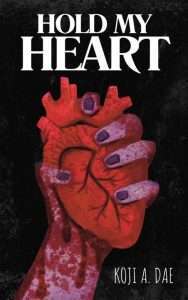 [KAD] I definitely write what I know, and all of my books are highly personal. For me it’s super important that my books have emotional depth and resonance, and the only way for me to achieve that is to write personally and emotionally. I don’t necessarily set out to explore these themes in my books —they just appear entwined with characters because they are my reality.
[KAD] I definitely write what I know, and all of my books are highly personal. For me it’s super important that my books have emotional depth and resonance, and the only way for me to achieve that is to write personally and emotionally. I don’t necessarily set out to explore these themes in my books —they just appear entwined with characters because they are my reality.
For example, with Mazi I didn’t set out to write a book that explores mental health and a poly D/s relationship. My intention when I started was to explore an interesting Bulgarian myth in a dark erotic fashion. And the same with Hold My Heart. I had no idea how deep into exploring mental health the story would eventually get. But because of who I am, those themes get pulled into my work. Once they end up on the page, I tend to go “oh, I can take a jog over and explore this, too!” As in, I’m here now, what truths about my lived experience can I pull out of this situation I’ve written myself into?
[GdM] This is your third full-length published work now. How do you feel about your career as a speculative fiction author now compared to when your debut came out?
[KAD] Honestly, I’m not sure that much has changed. These three books happened to find homes in a really short period of time. It’s been just a year since I released my first book, and now I have three out. Which feels almost a bit magical and I think it might take awhile for it to really sink in.
Right now I’m working on my next book, and I’m still dreading the process of submitting it to publishers, going through rejections, and finding the right team for it. It’s still a bit terrifying. I think the difference is that now I have more confidence that I will eventually find people who appreciate my stories, even if they are a bit dark and weird.
[GdM] What’s your experience been working with indie presses? Are there any notable advantages or disadvantages you’ve encountered?
[KAD] It’s been amazing so far! The teams at both Ghost Orchid and Tenebrous have been super communicative and supportive, and the end result is a book that’s better than the one I submitted getting out to a wider audience than I would have reached on my own. I think my favourite benefit (though there are quite a few) has been seeing the covers for these books come together. Both Ghost Orchid and Tenebrous care a lot about the art on their books, and so they have connections with some great artists that I probably wouldn’t have found on my own—and they know how to communicate with them to get some really great covers. I absolutely love the cover on Hold My Heart, which the art was done by Claire L. Smith and the layout was (I believe) done by Antonia. It really fit my vision for the book and it was so cool to see it come alive that way.
I can’t speak to the differences between indie presses and the larger traditional presses, but I can say that for me, I wouldn’t have been able to self publish these books. I have no desire to handle the financial, administrative, or artistic side of book publication. I just want to write, and working with indie presses allows me to concentrate on putting stylus to glass and getting my words out.
[GdM] What can we expect from you next, that you’re able to talk about at least?
[KAD] Well, for starters you can expect a slower release schedule! Though I do hope to still publish a couple of short stories a year, it will probably be a while before I get another book out there. At the moment I’m working on another weird horror that involves alternate realities and is a critique of AI and social media. I’m going for “Severance if Clive Barker was the showrunner” vibes, but like everything I write, it will probably end up morphing quite a bit during edits. I’m having a lot of fun writing it, but it’s still in early stages.
Read Hold My Heart by Koji A DaeThe post INTERVIEW: Koji A Dae appeared first on Grimdark Magazine.
May 29, 2025
REVIEW: Harmattan Season by Tochi Onyebuchi
When a bleeding girl shows up at his flat one night and vanishes, a down-and-out veteran and private detective, Boubacar, finds himself tangled in an intricate case he reluctantly takes on. In this postcolonial West African city, otherness takes centre stage – whether you’re a floater or born of two races. Harmattan Season by Tochi Onyebuchi is a hard-boiled fantasy-noir that explores identity, injustice, and the voice within that just won’t let you live in peace.
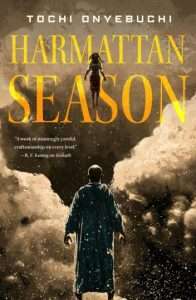 From page one, Onyebuchi offers readers witty prose that’s also very efficient. Too often, standalone mysteries tend to drag out setups. Not Harmattan Season, though. Boubacar’s character introduction is punchy and develops so much of the premise in just under two pages. I was thoroughly impressed and engaged in our detective’s seemingly bad luck. We also learn of a unique and fantastic ability of the dugu – floating – which the French colonists want to erase, obviously. One thing I did find rather interesting (and I am a firm believer of this) is the ethnic terms that weren’t explained in English. I felt that it made the book even more authentic, and I felt immersed in the cultural stigmas and nuances. I think this is also the reason why I felt the prose to be efficient.
From page one, Onyebuchi offers readers witty prose that’s also very efficient. Too often, standalone mysteries tend to drag out setups. Not Harmattan Season, though. Boubacar’s character introduction is punchy and develops so much of the premise in just under two pages. I was thoroughly impressed and engaged in our detective’s seemingly bad luck. We also learn of a unique and fantastic ability of the dugu – floating – which the French colonists want to erase, obviously. One thing I did find rather interesting (and I am a firm believer of this) is the ethnic terms that weren’t explained in English. I felt that it made the book even more authentic, and I felt immersed in the cultural stigmas and nuances. I think this is also the reason why I felt the prose to be efficient.
Throughout the story, there is a strong sense of colonial bitterness that is also central to Bouba’s internal turmoil, being half-French and half indigenous Dugulen. Harmattan Season explores the intricacies of what it means to be mixed-race in a hegemonic society, never really knowing where you fit in and always feeling like you have to choose one side over the other. Although the plot was filled with twists and earth-shattering political tension, I found myself very drawn to Bouba’s internal struggles with his unsettling past and navigating his lost heritage.
“Most days, you feel like you’ve left the dugu behind with all its superstitions and its ways of worship. Then something happens and you open your eyes to realise you’ve been mumbling a prayer this whole time.”
The world in which Harmattan Season is set in is also very interesting – despite being an unnamed city, indigenous customs and characters breathe life into the worldbuilding. As readers are taken through dark alleys, shisha parlours and Ethnic Quarters designed to house the indigenous population, they are witnesses to the injustices against marginalised communities everywhere.
The dry humour in the novel also had me laughing out loud a lot of the time. I enjoyed Bouba’s banter with supporting characters – most of them unnamed – like the one street urchin who offers Bouba his services. We only know him as ‘the urchin’. Justice for Urchin! I think the conversations with this little kid gave our main character more dimension and made me want to root for him.
I am thoroughly impressed by Harmattan Season. As short as it is, the novel perfectly balances its hard-boiled and fantasy-noir elements, and somehow still manages to blend in cultural nuances throughout. Onyebuchi’s writing style is incredibly witty, memorable and deeply empathetic. I highly suggest you strap on your sandals and give Harmattan Season a read.
Read Harmattan Season by Tochi OnyebuchiThe post REVIEW: Harmattan Season by Tochi Onyebuchi appeared first on Grimdark Magazine.
May 28, 2025
REVIEW: Solo Leveling Season Two
The second season of Solo Leveling, subtitled Arise from the Shadow, has all the makings of a grimdark anime classic. Based on a Korean web novel of the same name, Solo Leveling takes place in a modern South Korea where portals to monster-infested dungeons appear, threatening to overrun humankind if they are left unchecked. In order to maintain peace, guilds of monster hunters raid the portals, systematically eliminating each enemy on their way to the boss at the end of the dungeon.
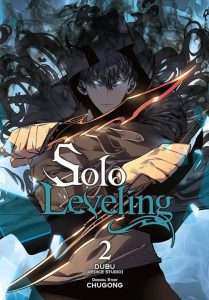 Each hunter has a designated rank, which is innate and immutable. Sung Jinwoo, the protagonist of Solo Leveling, is the Mr. Irrelevant of the hunter guilds, the weakest warrior of the lowest rank. However, after surviving a massacre early in the first season, Sung Jinwoo discovers that he has the unique ability to level up, growing his powers by defeating increasingly powerful monsters. It’s as if Sung Jinwoo is the main character in his own role-playing game.
Each hunter has a designated rank, which is innate and immutable. Sung Jinwoo, the protagonist of Solo Leveling, is the Mr. Irrelevant of the hunter guilds, the weakest warrior of the lowest rank. However, after surviving a massacre early in the first season, Sung Jinwoo discovers that he has the unique ability to level up, growing his powers by defeating increasingly powerful monsters. It’s as if Sung Jinwoo is the main character in his own role-playing game.
Season two of Solo Leveling surpasses the first season in every respect: more action, more character development, and a surprising amount of emotional depth, especially in the latter episodes. The relationship between Sung Jinwoo and his mother is especially moving, as he will go to any lengths to help her recover from her years-long coma. While his mother is sick, Sung Jinwoo has also taken charge of his younger sister, a responsibility he must balance with his role as a progressively powerful hunter.
The action scenes in Solo Leveling are absolutely spellbinding. I sometimes worried that Sung Jinwoo would become too powerful too quickly, but the increasingly fearsome enemies kept pace with our protagonist and kept my heart pounding throughout the entirety of the season. There are also expanded roles for other hunters in the second season, allaying one of my criticisms of the first season that there was too much “solo” in Solo Leveling.
The second season of Solo Leveling has probably the best use of necromancy that I’ve seen anywhere. All of this is building up to an epic battle between the top-tier hunters and an army of insectoid monsters on Jeju Island that could have easily sprung out of a Michael R. Fletcher novel. The animation in Solo Leveling is top-notch, among the best in modern anime, and the voice acting is also outstanding.
Altogether, grimdark anime fans are sure to devour the second season of Solo Leveling. The combination of traditional Dungeons & Dragons-type tropes with an urban low-fantasy setting works very effectively. Although season two has a satisfying conclusion, there are still major questions left open to address in the third season (which can’t come soon enough).
The post REVIEW: Solo Leveling Season Two appeared first on Grimdark Magazine.
May 27, 2025
EXCLUSIVE: Cover reveal for The Scour by Richard Swan
The Empire of the Wolf trilogy (The Justice of Kings, The Tyranny of Faith, and The Trials of Empire) is one of my absolute favourite dark fantasy trilogies, so when author Richard Swan agreed to publish The Scour as part of our 2025 novella releases, I nearly passed out with excitement. Once I’d read the novella–it’s absolutely fucking awesome, just quietly–I knew I had to throw the kitchen sink at the cover.
The Scour by Richard SwanCollaborating with Richard on this cover was an absolute world of fun. And when you get to work with an artist like Rene Aigner and the titan that is Shawn King, you know something amazing is going to come out the other side.
This brilliant creative duo did not disappoint.
And so, without further ado, I give you the cover for one of the most anticipated dark fantasy releases of 2025!

Fifteen years before the events of The Justice of Kings, Vonvalt and Bressinger investigate the imprisonment of a fellow justice for murder.
Pre-order The ScourThe Scour by Richard Swan is currently available for pre-order in ebook, but will also be released in hardcover, paperback, and signed special edition. Pre-order below.
The post EXCLUSIVE: Cover reveal for The Scour by Richard Swan appeared first on Grimdark Magazine.
May 26, 2025
REVIEW: The Gilded Crown by Marianne Gordon
Do you have a bookish friend whom you are sure you would like the recommendations from? Luckily for me, as part of the Grimdark Magazine review team, I have many like-minded friends with excellent reading suggestions. Through one of their recommendations, I picked up The Gilded Crown, a debut dark fantasy novel by Marianne Gordon. The first in a duology, The Gilded Crown is the story of a woman called Hellevir and her rare magical ability. Hellevir can raise the dead.
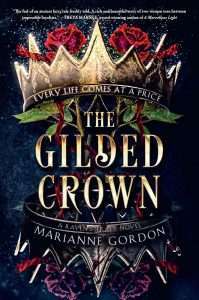 When Hellevir first visits Death, she is ten years old. She doesn’t initially realise that for every soul she brings back from Death, she has to pay a price. A piece of her body. A piece of her soul. When she is an adult, influential people discover her skill, and she finds herself trapped. Hellevir is charged with protecting Princess Sullivain and must bring her back from the dead no matter the cost. If she refuses or fails, the Queen will have everyone she cares for killed. As the resurrections continue, the price Hellevir pays increases; Death will always take what he is due.
When Hellevir first visits Death, she is ten years old. She doesn’t initially realise that for every soul she brings back from Death, she has to pay a price. A piece of her body. A piece of her soul. When she is an adult, influential people discover her skill, and she finds herself trapped. Hellevir is charged with protecting Princess Sullivain and must bring her back from the dead no matter the cost. If she refuses or fails, the Queen will have everyone she cares for killed. As the resurrections continue, the price Hellevir pays increases; Death will always take what he is due.
I went into The Gilded Crown fairly blind to the plot, armed only with the knowledge that I trusted the friend who said I’d enjoy it. They were right, The Gilded Crown is a good dark fantasy, set in a richly complex world, and it will appeal to readers who enjoy those sorts of novels. Many political and religious machinations are at play, of which Hellevir is not a central piece. Her anxiety about navigating this complicated and dangerous world as a pawn in this larger game that she doesn’t fully understand is incredibly relatable. Religion, particularly religious oppression, and parental alienation are significant themes in The Gilded Crown, which will resonate differently for readers depending on their experiences.
Most of the darkness in The Gilded Crown comes from the fact that the magic in the novel is death magic. The reader should expect a lot of death. Some more poignant than others. Some very violent. It makes you question life’s value. If Princess Sullivain knows she will be resurrected, how much value does she place on her life? Is her life more valuable because her death will trigger a war? What makes her more worthy of another chance than a poor child or a stray cat? Hellevir wrestles with all these issues and her attraction to Sullivain, even though Sullivain is not particularly likable. Hellevir does seem to have a strange fascination with powerful beings who pay her attention – the character also has powerful chemistry with Death. However, this is nowhere close to a romantic attachment. I will also make abundantly clear that anyone trying to slap a romantasy label on The Gilded Crown is wrong. Besides a small amount of confused attraction, there’s no romantic subplot at work in the novel. It is a story of anxious, somewhat toxic people, in a dangerous world, trying not to mess it up even more. Not a love story. Not even close.
As the first in a duology, The Gilded Crown sets up nicely for the next novel. It is quite pleasant to feel, when I start The Antlered King, that I’m ready for a conclusion to everything. The fantasy world is full of trilogies and longer series, which are great, but two books for a finished arc gives a chance for deeper world-building than a standalone novel, without the long-term reading commitment of a bigger series. As a dark fantasy, The Gilded Crown worked for me. I liked Hellevir as a flawed central character, and Gordon’s writing interested me in her journey. I also enjoyed the other relationships in the story – Hellevir’s family dynamic, how she tries to maintain those relationships despite being iced out by a parent, and the bond with her brother were stand-out moments for me as good parts of the story, which weren’t the death magic.
The Gilded Crown’s satisfying ending left me with some theories about where the threads will go in the next novel. I look forward to continuing with the final book, The Antlered King, shortly. Thank you both to Marianne Gordon and the team at Harper Voyager for sending us a copy.
Read The Gilded Crown by Marianne Gordon
The post REVIEW: The Gilded Crown by Marianne Gordon appeared first on Grimdark Magazine.
May 25, 2025
REVIEW: Paradise
Paradise is a 2025 political thriller that shockingly diverts into a science fiction one after the first episode. It’s one of those things that is best experienced without spoilers so if you want to enjoy Paradise in the best manner possible, you should go and watch it without reading any further. It’s a good series. There are some flaws but it is a solid and serious take on the subjects it tackles. It also has a truly spectacular seventh episode. That’s about as much as I can say about the series without spoiling anything.

You ready for more?
Okay then.
The premise for Paradise is that Xavier Collins (Sterling K. Brown) is the head of the United States Secret Service, protecting the President of the United States, Cal Bradford (James Marsden). Cal is assassinated and there’s a severe question of how the Secret Service could fail so utterly. A lot of allusion is made to things having gone horribly wrong as well as a once close friendship between the two that went horribly wrong. At the end of the first episode, we finally find at least one of those secrets out.
You ready?
No take backs.
Specifically, the secret is that the two are living in a massive underground city and the rest of the world has been destroyed in some sort of unnamed catastrophe. The disaster was successfully predicted by a billionaire tech mogul, Samantha “Sinatra” Redmond (Julianne Nicholson) who used both her and their government’s resources to make a luxury bunker to ride out the apocalypse.
Paradise basically takes the premise of Fallout and proceeds to do it completely straight. If I had to make a comparison, I’d say it’s what happens if you combine Fallout with Lost. Every character is carrying immense survivor’s guilt as well as dealing with a variety of tragic backstories. America was not in its best shape even before the apocalypse and what happened to the surface world is another driving mystery. We get a decent set of answers to most of the pressing questions but, like all good writing, adds more questions.
Sterling K. Brown does a fantastic job at making a lead that isn’t necessarily the most likable individual. His wife didn’t make it down to the bunker in time for it to be shut and his hatred for both the President he’s sworn to protect is only matched for his own. The fact his kids depend on him to provide a semblance of a normal life and the remainder of what qualifies as military force/security in the 10,000 person community falls under him doesn’t relieve his stress. James Marsden also gets to show off his acting chops as Cal is a somewhat Bill Clinton-esque figure who has his vices but was, ultimately, a good man in a horrifying situation. Much of the series deals with flashbacks to his tenure as President as well as setting up his life in the bunker.
If the episode has a highlight and lowest point, it will be the seventh and eighth episodes. The seventh episode finally provides concrete answers as to what happened during the End of the World and how everyone responded to it. It is well-written, dramatic, and even genuinely horrifying at times. Some of the best television I’ve seen in the past decade. The eighth episode, sadly, provides a thoroughly unsatisfying answer to the President’s murder.
Paradise has a lot of themes of class consciousness, environmentalism, wealth inequality, government corruption, corporate malfeseance, and more but they’re all very subtle. All of the survivors in the bunker are the “lucky ones” that get to live in a climate controlled Rockwellian community while the rest of humanity has gone extinct (maybe). However, society is set up so there’s still people who clean the toilets, pour coffee, and serve an elite that doesn’t make any sense to have anymore.
In conclusion, I strongly recommend this series. It’s some of the best science fiction I’ve seen in years and certainly deserves to have many more people talking about it than I’ve seen. I was a bit disappointed by the final episode but absolutely want to see another season of this if not several more.
The post REVIEW: Paradise appeared first on Grimdark Magazine.
May 24, 2025
REVIEW: I Can Fix Her by Rae Wilde
Like all great horror authors, the messages of Rae Wilde’s books work for both a specific and a universal audience. From her triumphant revenge tale Merciless Waters through to her resplendently incel-baiting-titled collection I Do Not Apologize for My Position on Men, Wilde has developed, through her queer horror, an unapologetic, raw, feminism which examines the freedom that comes with being allowed to be imperfect. But Wilde’s work has also covered universal themes of rage and love and self-hatred. Nowhere is this more true than her latest effort, I Can Fix Her, out from Clash Books June 3, a literary horror time-travel lens into a toxic queer relationship trapped in a grim space-time purgatory that also functions as a trauma-hallucinogen thought experiment for anyone, queer or not, who’s wasted part of their life trying to love or be loved in a relationship that all your friends know is inexplicable masochism. This one really fucked me up, and I love it deeply for that.
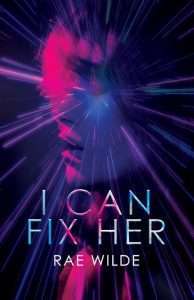 It begins with Johnny spotting her ex-girlfriend, Alice, at the local café, complete with a sense of déjà vu. Angry about their break-up, she’s compelled to give her ex a second chance and soon she’s back at Alice’s apartment. What happens next is a week, all spent in the apartment, where it quickly becomes clear that nothing is what it seems, reality is not behaving normally, and Johnny’s goal of changing the toxic cycle that drives their relationship will be harder to achieve than she realised.
It begins with Johnny spotting her ex-girlfriend, Alice, at the local café, complete with a sense of déjà vu. Angry about their break-up, she’s compelled to give her ex a second chance and soon she’s back at Alice’s apartment. What happens next is a week, all spent in the apartment, where it quickly becomes clear that nothing is what it seems, reality is not behaving normally, and Johnny’s goal of changing the toxic cycle that drives their relationship will be harder to achieve than she realised.
I don’t know if I’ve given that plot justice, but rest assured, I Can Fix Her is not just two people talking about their relationship for a week, although given Wilde’s sublime prose and dialogue I’d still read that book in a shot. Rather, it’s a perverse cyclone of fever nightmare logic, symbolic imagery whose cleverness won’t become apparent until you’ve read the denouement, ultra visceral gore, and a descent into cosmic madness. I imagined much of it like the scene from the film Inception where dream logic is introduced and buildings arch into the sky at impossible angles, complete with Hans Zimmer horns blaring out the sapphic chain of self destruction.
But if that sounds too abstract, be assured there’s a distinct theme tunnelling its way through I Can Fix Her like a possessed tapeworm: how one person in a relationship can hammer their head against the other, desperate to change them, unwilling to see their own self-hatred, unwilling to accept that the only change is to leave. Wilde has ruthlessly identified how pathological this form of relationship is; how perverse it can be; how it turns love into this violent, self-immolating thing that defies sense. If you know you know, and this book’s coming for you. That said, it’s a mistake to make it too universal and forget this is a sapphic relationship. These women are fucking up in plain sight—that’s the point. Queer women will see further angles than I as Captain Straight of the USS Man did. Nonetheless, this book captured my past sins more than anything I’ve read for a while, regardless of the author’s intent.
And then there’s the denouement, which ties things up narratively and thematically. As much as I loved what prefaced it, I needed this ending—a cold, clear-eyed, heartbreaking counterpoint to the abstract madness before it, pitch-perfect dialogue encapsulating the cyclical inevitability of our toxic delusions. It’s a brilliant ending—if anyone accuses this book of being confusing, then they fell asleep before this. It introduces the idea, perhaps even more revelatory than the themes discussed earlier, of the divisibility of the self; how you can watch yourself from afar, knowing what you’re doing is wrong even as you’re compelled to do it. How one day, your future self will wonder if that was ever really you who fucked up so badly. Is it hopeful? Is it depressing? Who knows—maybe that’s the point.
Overall, with I Can Fix Her, Rae Wilde has taken risks and absolutely no prisoners. If you’ve ever been in a relationship where you’re both bad for each other, then this nightmarish groundhog day of surreal narrative genius is coming for your jugular and trust me—you need to bleed.
Read I Can Fix Her by Rae WildeThe post REVIEW: I Can Fix Her by Rae Wilde appeared first on Grimdark Magazine.



